The emergency closure of the Baltic cod fishery in 2019 was the sad low point of mismanagement of Baltic fisheries. The Low Impact Fishers Europe (LIFE) apex organisation of small-scale, coastal fishers had invited managers, NGOs and other interested parties to a consultation to explore how to stop the desastrous downward spiral. Since 2019 things have not improved. On the contrary. The collapse of cod in the Western Baltic has also been followed by that of herring and sprat as major food of cod. The flatfishes are still there but can not replace either the ecological function or the economic role of the collapsed species in the ecosystem. Marta Cavallé, Executive Director of LIFE, flanked by Brian O’Riordan, her predecessor, opened the meeting and welcomed all participants.
Christian Tsangarides, LIFE BANS coordinator, provided a well documented panorama about the decline of demersal (bottom) and pelagic resources in different parts of the Baltic. He reminded the audience that a semi-enclosed sea with gradually lower salinity north- and eastwards of its connection to the North Sea was per se a difficult habitat preventing most fish species from reaching the bigger sizes in the North Sea and North Atlantic.
He also questioned the wisdom of allowing industrial fisheries to be let loose on herring and sprat for reduction to fish meal for Norwegian salmon fattening, while the same fish if it were allowed to grow and be caught with less impact gear in lower quantities for direct human consumption, would provide jobs and income for thousands of families.
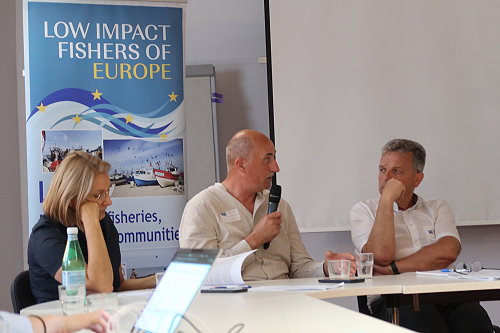
Bengt Larsson speaking later in the panel session flanked by Maja Kirchner of DG MARE and Bernd Söndgerath of the German Ministry for Food and Agriculture (BMEL)
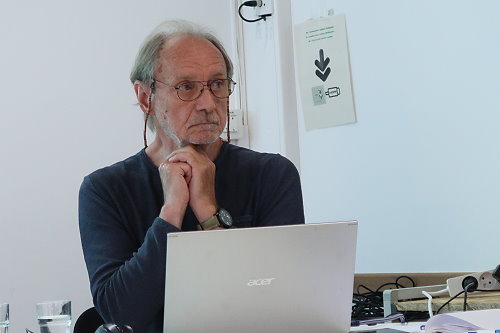
Rainer Froese of GEOMAR, Kiel, regretted science-led mismanagement and suggested revised threshholds for recovery
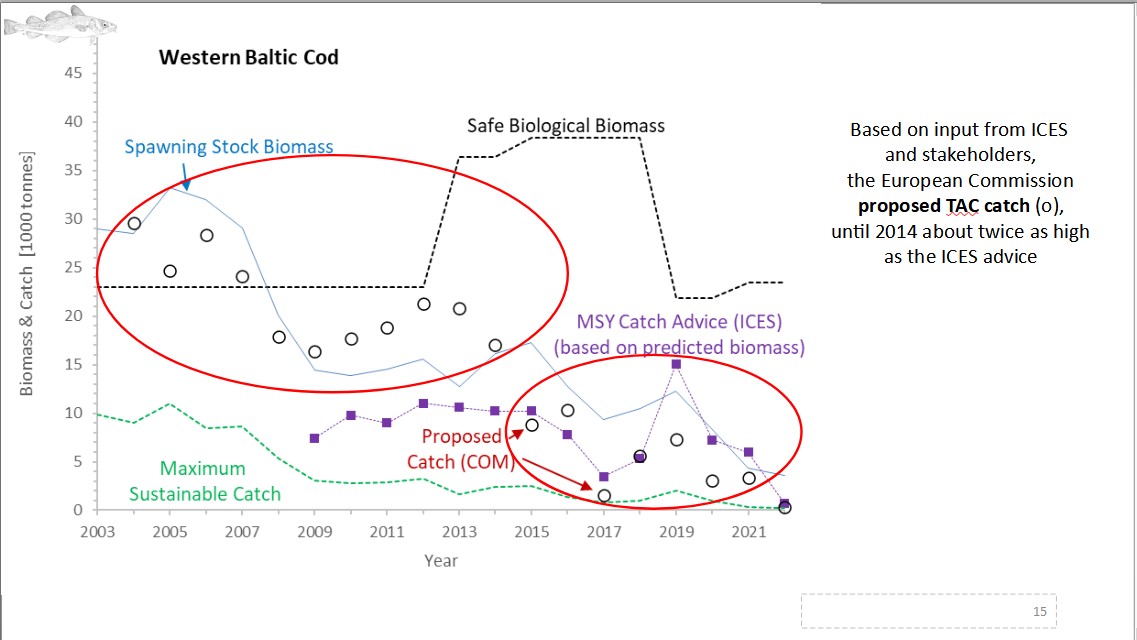
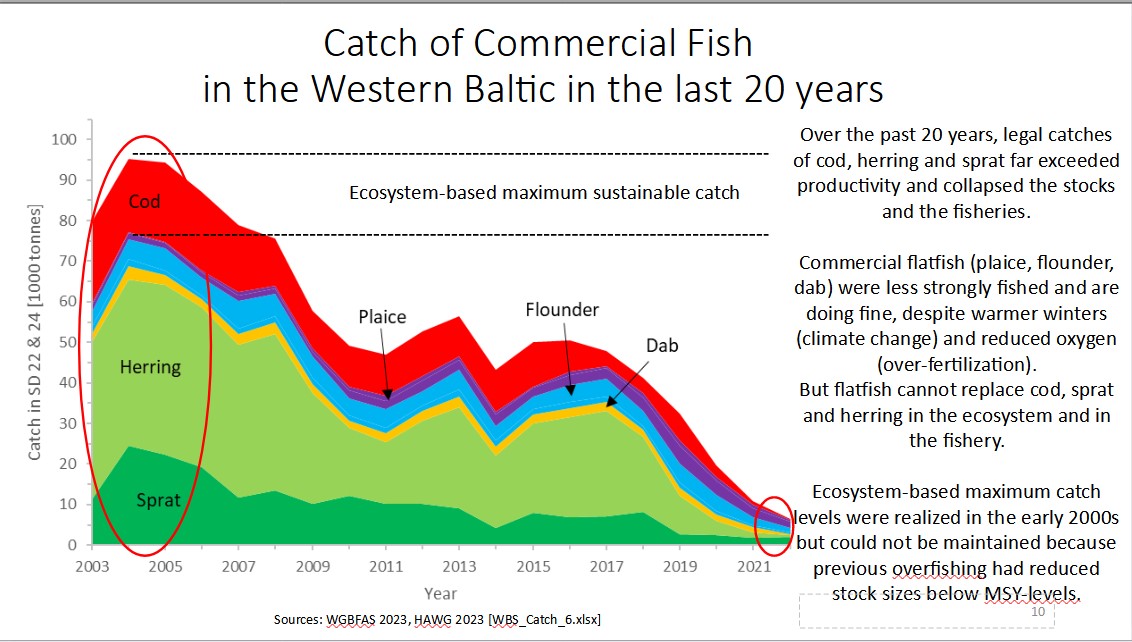
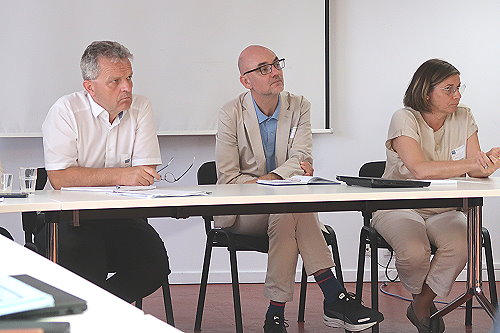
Some panelists, from right to left: Isabella Lövin, newly elected MEP for the Greens who had been a force during the CFP reform process and was coming back to help safe what was possible, Nils Höglund (CCV) and Bernd Söndgerath (BMEL)
Small-Scale Fisheries Academy
- SSF and Environmentalists rethink fisheries together
- Make Fishing Fair
- Foreign overfishing fuels Senegal’s deadly migration crisis to Europe
- Mundus maris at MARE 2025
- Small-scale fishers at the center of ocean governance and food security
- Make Fishing Fair in the EU, 25 March 2025
- Human – Biodiversity Relationships Across Scales
- World Fisheries Day, 21 November 2024, celebrated in Nigeria
- Mundus maris participated in the 2024 World Fisheries Day organized by Canoe and Fishing Gear Association of Ghana (CaFGOAG).
- Mundus maris contribution to the UNOC3 public consultation
- Small-Scale Fisheries Summit in Rome, 5-7 July 2024
- Regional Symposium on European Small-Scale Fisheries, Larnaca, Cyprus, 1-3 July 2024
- Baltic Fisheries Emergency Meeting, Brussels, 26 June 2024
- Ambivalent role of Market and Technology in the Transitions from Vulnerability to Viability: Nexus in Senegal SSF
- Shell fisheries as stewardship for mangroves
- African edition of 4WSFC in Cape Town, 21 to 23 November 2022
- World Fisheries Day, 21 November 2023
- Webinar: Nigeria’s Fisheries challenges and opportunities
- Presenting the FishBase app at the Symposium in Tervuren
- MARE Conference on Blue Fear – Mundus maris reflects
- The Transition From Vulnerability to Viability Through Illuminating Hidden Harvests, 26 May 2023
- EGU sessions focused on geoethics and joint learning, 23-28 April 2023
- Solidarity with artisanal fishers in Senegal and Mauritania
- The legal instruments for the development of sustainable small-scale fisheries governance in Nigeria, 31 March 2023
- Tools for Gender Analysis: Understanding Vulnerability and Empowerment, 17 February 2023
- Community resilience: A framework for non-traditional field research, 27 January 2023
- Sustainability at scale – V2V November webinar
- European edition of 4WSFC in Malta, 12-14 September 2022
- Mundus maris contributes to SSF Summit in Rome
- Women fish traders in Yoff and Hann, Senegal, victims or shapers of their destiny?
- The Academy continues its work in Yoff
- Illuminating the Hidden Harvest – a snapshot
- Virtual launch event FAO: International Year of Artisanal Fisheries and Aquaculture
- The Small-Scale Fisheries Academy as a source of operational support to PA Guidelines
- World Fisheries Congress, Adelaide, 20-24 September
- Mundus maris supports the fight of Paolo, the fisher, in Tuscany, Italy
- Catching-up – SSF Academy Yoff, 27 Febr. 2021
- Strengthening capacities of the actors for sustainable small-scale fisheries
- Testing training methods during the pilot phase of the SSF Academy in Senegal
- A premiere – launch of a Small-Scale Fisheries Academy in Senegal
